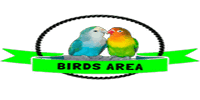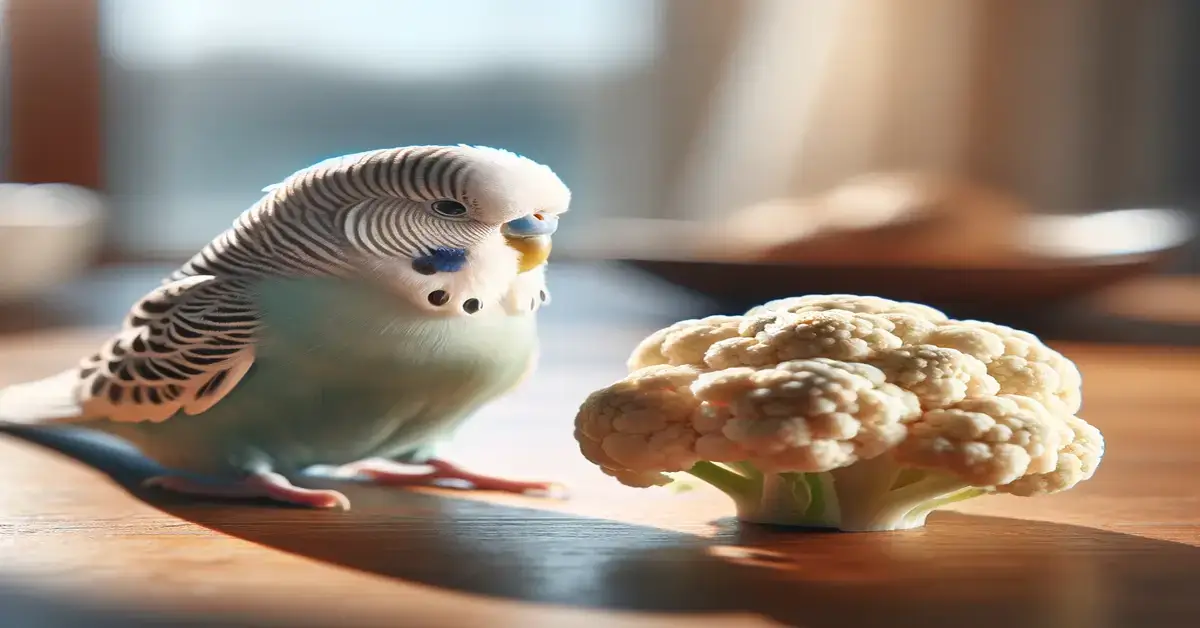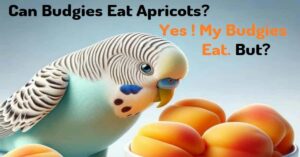Can Budgies Safely Eat Cauliflower?
The answer is yes—budgies can safely eat cauliflower.
Like any pet, Budgies need a balanced and nutritious diet to thrive. If you’re a budgie owner, you may have wondered about introducing new foods into your budgie’s diet. One vegetable that might catch your eye is cauliflower. But can budgies eat cauliflower, and is it beneficial for them?
In short, yes, cauliflower can be a healthy addition to your budgie’s diet, but like any food, there are things to consider. From its nutritional benefits to how much and how often it should be given, this guide will cover everything you need to know about feeding cauliflower to your feathered friend.
Keep reading to ensure you’re giving your budgie the best care possible.
Can Budgies Safely Eat Cauliflower?
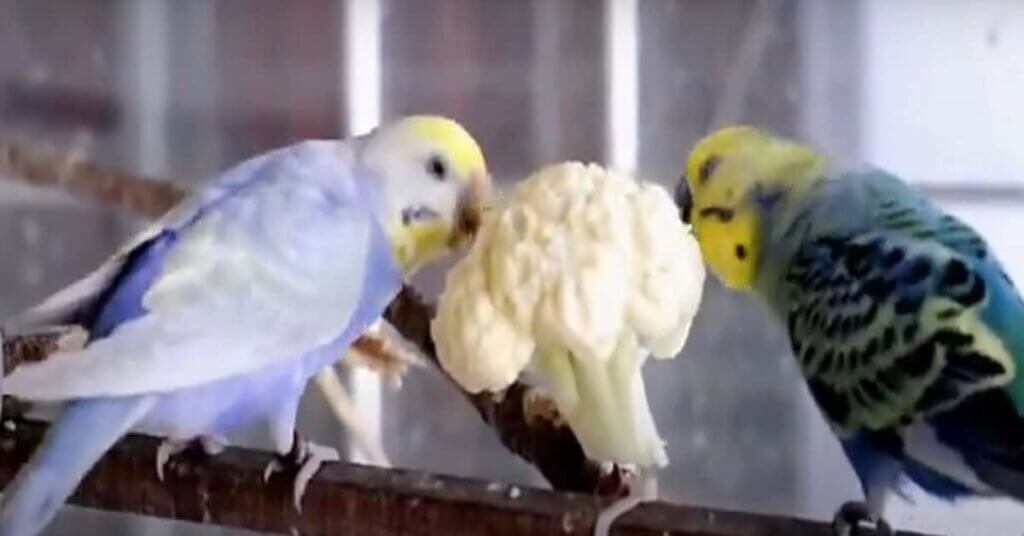
Already, you know that your budgie can safely eat cauliflower, and it can be an excellent addition to their diet when given in moderation. Cauliflower is not only safe, but it also offers unique nutritional benefits that support a budgie’s overall health.
It’s packed with essential vitamins and minerals that support your budgie’s overall health. However, as with any new food, there are some key considerations when feeding cauliflower to your bird.
Moreover, there’s an important aspect that most people miss: not all cauliflower parts are the same in nutrient content or in how they affect your budgie. The lesser-known cauliflower core can be fed in small amounts but requires extra care.
1. The Nutritional Value of Cauliflower for Budgies
Cauliflower is loaded with nutrients that are beneficial for your budgie’s health. It’s rich in:
- Vitamin C: This boosts your budgie’s immune system, helping them fight off diseases. And it helps to keep your budgie’s body healthy and strong.
- Vitamin K: Supports healthy blood clotting and bone development.
- Fibre: Aids in digestion and keeps the gut healthy, reducing the risk of digestive issues.
- Choline: This nutrient is rarely mentioned but plays a vital role in brain function. It can help keep your budgie sharp and responsive.
One uncommon fact that many people don’t realise is that the leaves and core of cauliflower contain a different balance of nutrients compared to the florets.
The core, particularly, has more fibre and can cause mild stomach issues if too much is fed. It is best to stick to the florets and leaves, giving the core in tiny amounts to avoid digestive problems.
2. Cauliflower as a Mental Enrichment Tool
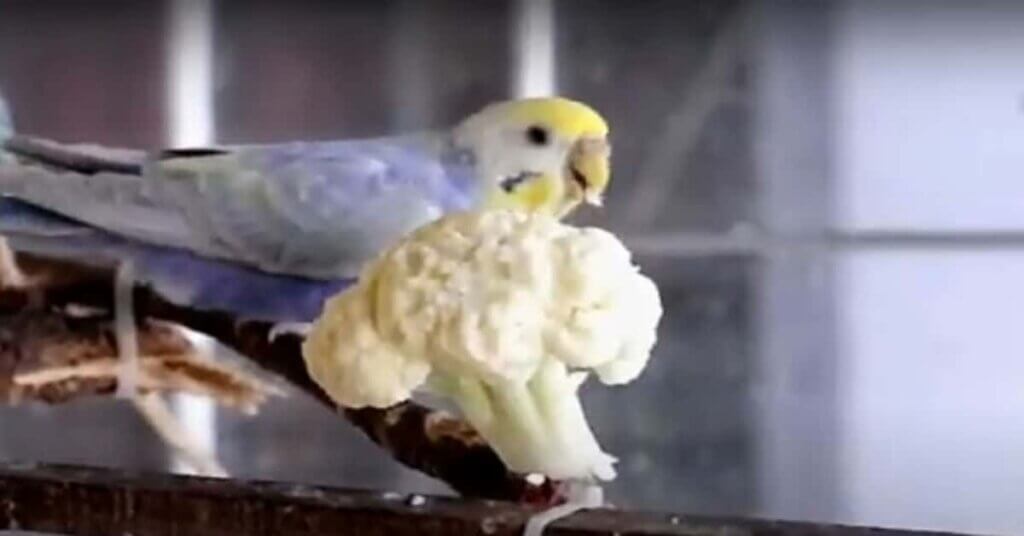
One interesting and rarely discussed benefit of cauliflower is its potential use for mental enrichment. Budgies are intelligent birds that need mental stimulation.
The texture of cauliflower, both the florets and the leaves, offers a fun way for budgies to engage with their food. You can hang a small piece of cauliflower in their cage or use it as part of a foraging toy to make mealtimes more interactive.
By hanging a piece of cauliflower from a string or hiding it in foraging toys, you give your budgie a chance to problem-solve and stay entertained, which is crucial for their mental health.
How Much Cauliflower Should You Feed Your Budgie?

While cauliflower is safe, it’s essential to feed it in moderation. Budgies have tiny digestive systems; offering them too much cauliflower at once can lead to digestive issues like diarrhoea or bloating.
A small piece—around the size of your budgie’s beak—is typically enough. As part of a varied diet, you can feed them cauliflower once or twice a week.
To prevent overfeeding, mix cauliflower with other safe veggies. Consider incorporating these uncommon yet beneficial foods alongside cauliflower:
- Dandelion greens: Packed with calcium and vitamin A, dandelion greens are a powerhouse of nutrition. You can find them in your garden, but ensure they’re pesticide-free.
- Chickweed: This wild plant is rich in vitamins and makes an excellent foraging treat for budgies.
- Watercress: Watercress is high in vitamins C and E, and it is another unique option that budgies rarely receive but that can significantly boost their diet.
This offers variety and helps ensure your budgie doesn’t get too much cauliflower at once.
Tips for Introducing Cauliflower to Your Budgie

If your budgie has never tried cauliflower, it’s best to introduce it slowly. Offer a small piece and see if they enjoy it. Some budgies may be hesitant initially, mainly if they aren’t used to eating vegetables.
To increase Budgie’s interest in eating cauliflower, I also have a good trick that I follow. I offer cauliflower to my budgie to mix it with their favourite fruit, like a small piece of apple or pear.
This not only encourages them to try something new but also provides them with different textures and tastes that keep their meals interesting.
Keep an eye on your budgie for any signs of discomfort or illness. If everything looks normal, you can gradually increase the amount.
Hidden Dangers: What You Must Avoid When Feeding Cauliflower To Budgies
Here’s an essential but often overlooked point: while cauliflower itself is safe, avoiding pesticide residue is crucial. Budgies are sensitive creatures, and even small amounts of pesticides can be harmful.
Always opt for organic cauliflower or wash it thoroughly under running water to remove any chemicals.
Additionally, avoid giving your budgie any seasoned cauliflower. Salt, butter, oil, and other seasonings can be dangerous for birds, even in small quantities. Stick to plain, raw, or lightly steamed cauliflower to keep your budgie safe.
Too much cauliflower can lead to bloating or digestive upset. If you notice your budgie acting sluggish or showing signs of stomach discomfort after eating cauliflower, stop feeding it and consult your vet.
Is Raw or Cooked Cauliflower Better for Budgies?
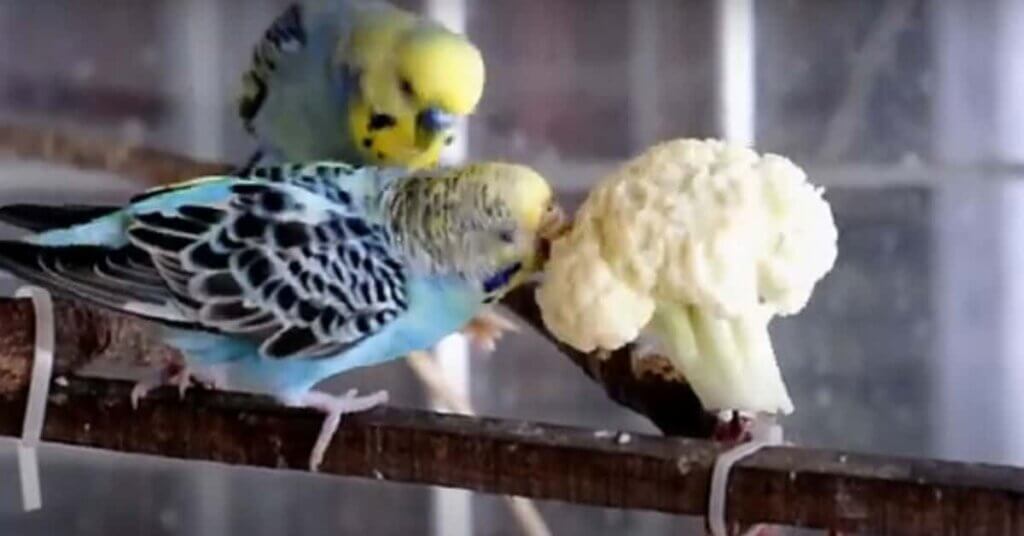
Budgies can eat both raw and lightly cooked cauliflower. Here’s how to prepare it:
- Raw Cauliflower: This is the easiest and best option. Just wash the cauliflower thoroughly to remove any pesticides or dirt. Chop it into small, bite-sized pieces.
- Cooked Cauliflower: You can also steam the cauliflower lightly if you prefer. Make sure it’s completely cooled before serving. Avoid boiling or frying, and never add salt, oil, or spices, as these can harm your budgie.
Can Budgies Eat Cauliflower Leaves and Stems?

Yes, budgies can eat cauliflower leaves as well. Cauliflower leaves are actually more nutritious than the florets. The leaves are high in calcium, essential for your budgie’s bone health and egg-laying in females.
While most pet owners focus on the florets, offering your budgie small amounts of washed cauliflower leaves can be more beneficial in some instances.
You can offer small amounts of cauliflower leaves once or twice a week alongside other vegetables like spinach, kale, or lettuce. The leaves provide a fun texture for your budgie to explore, keeping them engaged and satisfied.
On the other hand, cauliflower stems (also known as the core) should be fed sparingly. The stem is fibrous and more complicated to digest, so if you choose to offer it at all, it’s best to cut it into tiny pieces.
Uncommon Fact: Budgies Can Benefit from Cauliflower Juice
Cauliflower juice can be offered in small quantities. When you lightly steam cauliflower and cool it down, the water left behind (rich in nutrients) can be offered to your budgie. This method allows your bird to get the essential vitamins, particularly vitamin C, without consuming too much solid food.
To make cauliflower water:
- Lightly steam a few pieces of cauliflower.
- Let the water cool down completely.
- Offer a teaspoon of the cauliflower water once weekly as a special treat.
This is especially useful if your budgie isn’t a fan of solid vegetables but still needs the nutrients.
Frequently Asked Questions
Can budgies eat frozen cauliflower?
Yes, budgies can eat frozen cauliflower, but it must be fully thawed and rinsed with water before serving. Avoid giving them cold or icy cauliflower, which could upset their digestive system.
Can baby budgies eat cauliflower?
Yes, baby budgies can eat cauliflower, but it should be introduced gradually and in very small portions. Ensure the cauliflower is soft by lightly steaming it or finely chopping raw pieces to avoid choking hazards.
Can cauliflower help with budgie weight management?
Cauliflower is a low-calorie vegetable that can be included in a weight management plan for budgies. It can be used as a healthy snack to avoid excessive calories, provided it’s balanced with their regular diet.
Can cauliflower cause allergies in budgies?
While rare, some budgies may have individual sensitivities or mild allergies to new foods. If you notice sneezing, lethargy, or changes in droppings after feeding cauliflower, discontinue use and consult a vet.
Does cauliflower affect a budgie’s feather colour?
Cauliflower contains nutrients like vitamins C and K, which help in overall health, but it doesn’t specifically affect feather colour. Other foods like carrots (rich in beta-carotene) are more likely to enhance feather vibrancy.
Should I peel the cauliflower for my budgie?
No, peeling cauliflower is not necessary. The florets and leaves are safe for budgies, but they should be washed thoroughly to remove any dirt or pesticide residue before feeding.
Can I grow cauliflower at home to feed my budgie?
Yes, growing cauliflower at home is a great way to provide pesticide-free food for your budgie. Ensure the plant is organic and chemical-free and only serves small portions of the florets and leaves.
Final Thoughts on Feeding Cauliflower to Budgies
In conclusion, when given in moderation, cauliflower is a safe and healthy treat for budgies. It’s rich in vitamins like C and K, and its fibre helps digestion. However, wash it well and serve it in small portions.
Don’t forget that cauliflower leaves and even lightly steamed cauliflower water can provide additional nutrition for your bird.
To stand out, consider introducing cauliflower to your budgie’s diet in unique ways—like cauliflower juice or foraging toys—and always remember to offer a balanced variety of other fruits and veggies. Doing so will ensure your budgie stays healthy, happy, and engaged.
Hello Dear, I'm Poli Kolymnia, owner of many birds (including budgies).
With a deep passion for these feathered companions, I'm here to share my expertise and extensive knowledge on birds care.
My articles cover essential topics like diet, housing, care, and health, providing practical tips to help you create a happy and thriving environment for your birds.
